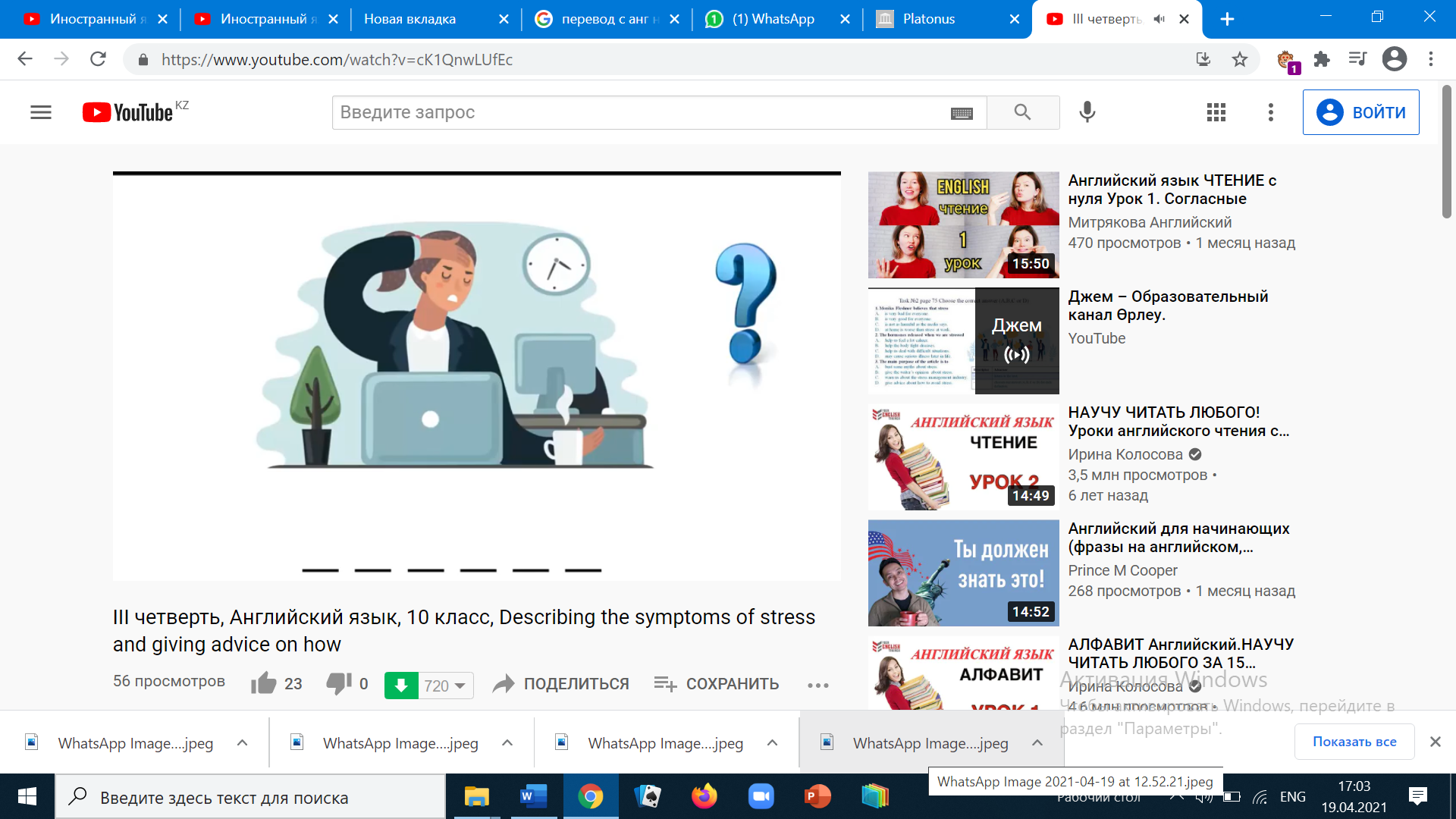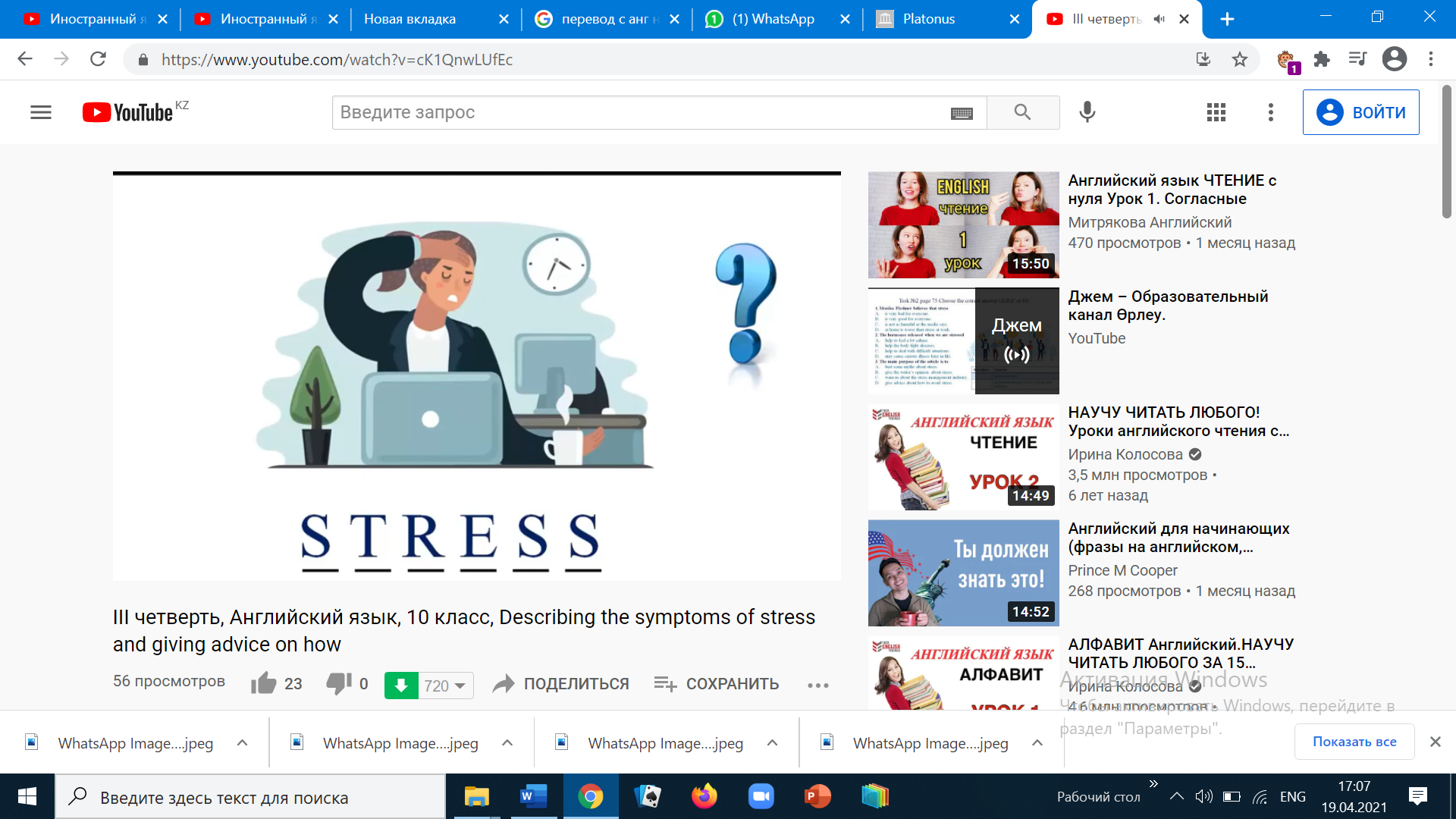
Short term plan
|
Unit of a long term plan VI Unit Capabilities of human brain. |
College: Construction and Technical College |
|||||||||||||||||||||||||||||||||||||||||||||||||||||||||||||||||||||||||||||||||||||||||||||||||||||||||||||||||||||||||||||||||||||||||||||||||||||||||||||||||||||||||||||||||||||
|
Date: 22.02.2021 |
Teacher name: Kulbarshin Isabayeva |
|||||||||||||||||||||||||||||||||||||||||||||||||||||||||||||||||||||||||||||||||||||||||||||||||||||||||||||||||||||||||||||||||||||||||||||||||||||||||||||||||||||||||||||||||||||
|
Group: |
Number present: 13 |
absent:0 |
||||||||||||||||||||||||||||||||||||||||||||||||||||||||||||||||||||||||||||||||||||||||||||||||||||||||||||||||||||||||||||||||||||||||||||||||||||||||||||||||||||||||||||||||||||
|
Lesson title |
Describing the symptoms of stress |
|||||||||||||||||||||||||||||||||||||||||||||||||||||||||||||||||||||||||||||||||||||||||||||||||||||||||||||||||||||||||||||||||||||||||||||||||||||||||||||||||||||||||||||||||||||
|
Learning objectives |
10.2.2 - understand specific information in unsupported extended talk on a wide range of general and curricular topics, including talk on a limited range of unfamiliar topics 10.3.3 - explain and justify own and others’ point of view on a wide range of general and curricular topics 10.5.2 - use a growing range of vocabulary, which is appropriate to topic and genre, and which is spelt accurately |
|||||||||||||||||||||||||||||||||||||||||||||||||||||||||||||||||||||||||||||||||||||||||||||||||||||||||||||||||||||||||||||||||||||||||||||||||||||||||||||||||||||||||||||||||||||
|
Lesson objectives |
Understand the gist of specific information and more details Practice listening and reading skills Ask and answer for general and detailed questions Describe the symptoms of stress Learn more words to describe the symptoms of stress Write advice to reduce stress |
|||||||||||||||||||||||||||||||||||||||||||||||||||||||||||||||||||||||||||||||||||||||||||||||||||||||||||||||||||||||||||||||||||||||||||||||||||||||||||||||||||||||||||||||||||||
|
Assessment criteria |
Identify specific information in unsupported extended talk Use vocabulary related to the stress Match the words with definitions Explain and justify own point of view Describe the symptoms of stress Write advice to reduce stress |
|||||||||||||||||||||||||||||||||||||||||||||||||||||||||||||||||||||||||||||||||||||||||||||||||||||||||||||||||||||||||||||||||||||||||||||||||||||||||||||||||||||||||||||||||||||
|
Cross-curricular links |
Biology |
|||||||||||||||||||||||||||||||||||||||||||||||||||||||||||||||||||||||||||||||||||||||||||||||||||||||||||||||||||||||||||||||||||||||||||||||||||||||||||||||||||||||||||||||||||||
|
Previous learning |
Multiple intelligences |
|||||||||||||||||||||||||||||||||||||||||||||||||||||||||||||||||||||||||||||||||||||||||||||||||||||||||||||||||||||||||||||||||||||||||||||||||||||||||||||||||||||||||||||||||||||
|
Level of thinking skills |
Knowledge Comprehension Application |
|||||||||||||||||||||||||||||||||||||||||||||||||||||||||||||||||||||||||||||||||||||||||||||||||||||||||||||||||||||||||||||||||||||||||||||||||||||||||||||||||||||||||||||||||||||
|
Plan |
||||||||||||||||||||||||||||||||||||||||||||||||||||||||||||||||||||||||||||||||||||||||||||||||||||||||||||||||||||||||||||||||||||||||||||||||||||||||||||||||||||||||||||||||||||||
|
Planned timings |
Planned activities (replace the notes below with your planned activities) |
Resources |
||||||||||||||||||||||||||||||||||||||||||||||||||||||||||||||||||||||||||||||||||||||||||||||||||||||||||||||||||||||||||||||||||||||||||||||||||||||||||||||||||||||||||||||||||||
|
Start 2 min
5 min
1 min
2 min |
Greeting I’m glad to see you on the English lesson! Checking up the home task.
The aim of this activity is to check students` previous knowledge. 1. Fill in: far-reaching, smart, calculated, proposing, excels, responded, memorize, rise, responded.
Check yourself 1. memorize 2. excels 3. calculated 4. smart 5. far-reaching 6. rise 7. proposing 8. responded Introduction of the topic Look at this picture and try to describe it with one common word of six letters.
Yes, you are right , it’s STRESS!
To introduce the topic The theme of our lesson is “Describing the symptoms of stress” On this lesson we are going to learn new vocabulary
Dear students, at the end of this lesson you will be able to identify types of stress, define, recognize them and learn how to reduce stress. |
PPT Slide 3
PPT Slide 4 PPT Slide 5 PPT Slide 6
|
||||||||||||||||||||||||||||||||||||||||||||||||||||||||||||||||||||||||||||||||||||||||||||||||||||||||||||||||||||||||||||||||||||||||||||||||||||||||||||||||||||||||||||||||||||
|
Middle 6 min. 3 min
7 min
7 min
6 min
7 min
7 min 7 min 8 min 2 min 7 min 3 min |
Let’s introduce the new words:
B 1. What is this video about? 2. What do you know about stress? The teacher sets some detailed questions relating to the video. After watching a video students answer for general questions. 1. What is the stress? Why is stress bad? 2. What is the causes of stress? Бұл материал сайт қолданушысы жариялаған. Материалдың ішінде жазылған барлық ақпаратқа жауапкершілікті жариялаған қолданушы жауап береді. Ұстаз тілегі тек ақпаратты таратуға қолдау көрсетеді. Егер материал сіздің авторлық құқығыңызды бұзған болса немесе басқа да себептермен сайттан өшіру керек деп ойласаңыз осында жазыңыз Short term
plan
Unit
of a long term plan VI
Unit Capabilities of human
brain. College: Construction and Technical
College Date: 22.02.2021
Teacher name:
Kulbarshin
Isabayeva Group:
Number present:
13
absent:0
Lesson title
Describing the symptoms of
stress
Learning
objectives
10.2.2 - understand specific
information in unsupported extended talk on a wide range of general
and curricular topics, including talk on a limited range of
unfamiliar topics
10.3.3 - explain and justify
own and others’ point of view on a wide range of general and
curricular topics 10.5.2
-
use a growing range of
vocabulary, which is appropriate to topic and genre, and which is
spelt accurately
Lesson objectives
Understand the gist of
specific information and more
details
Practice listening and reading
skills
Ask and answer for general and
detailed questions
Describe the symptoms of
stress
Learn more words to
describe the symptoms of
stress
Write advice to reduce
stress
Assessment criteria
Identify specific information
in unsupported extended talk
Use vocabulary related
to the stress
Match the words with
definitions
Explain and justify own point
of view
Describe the symptoms of
stress
Write advice to reduce
stress
Cross-curricular
links
Biology
Previous learning Multiple intelligences
Level of thinking skills Knowledge Comprehension
Application Plan Planned timings Planned activities (replace
the notes below with your planned
activities) Resources
Start
2 min
5
min
1
min
2
min Greeting I’m glad to see you on the
English lesson!
Checking up the home
task.
The aim of this activity is to check
students` previous
knowledge.
1. Fill
in: far-reaching, smart, calculated, proposing, excels,
responded, memorize, rise,
responded.
Miss
White gave us two poems to… for next
lesson.
Luke is
not good at mathematics, but he… at
languages. Sally… how much money she could save every
month. Aizhan is a very …girl who always does well on
tests.
Einstein’s theories had …implications for the way we see
the world.
It’s not
an easy task, but I’m sure you can, … to the
challenge.
They are
… that his theory is included in all teacher training
courses. Ulan … to every question in the interview quickly
and politely.
Check yourself
1.
memorize 2. excels 3. calculated 4. smart 5. far-reaching 6. rise
7. proposing 8. responded Introduction of the
topic
Look at this picture and try
to describe it with one common word of six
letters.
Yes, you are right , it’s
STRESS!
To introduce the topic
The theme of our lesson
is “Describing the symptoms of
stress”
On this lesson we are
going to learn new
vocabulary
understand the gist of
specific information and more
details
express your own
opinion
match the words with
definitions
ask and answer for general and
detailed questions
describe the symptoms of
stress
write advice to reduce
stress Dear students, at the end of
this lesson you will be able to identify types of stress, define,
recognize them and learn how to reduce
stress.
PPT Slide
3
PPT Slide
4
PPT Slide
5
PPT Slide
6
Middle 6
min.
3
min
7
min
7
min
6
min
7
min
7
min
7
min
8
min 2
min 7
min
3
min
Let’s introduce the new
words: English Transcription Kazakh Russian define [dɪˈfaɪn] анықтау определять adjust [əˈjəst] реттеу регулировать variety [vəˈraɪətɪ] әр
түрлі разнообразие acute [əˈkjuːt] өткір, күшті острый,
сильный decompress [diːkəmˈpres] қысымды төмендету уменьшать давление eliminate [ɪˈlɪmɪneɪt] жою устранять cognitive behavioural therapy
[ˈkɒɡnɪtɪv
bɪˈheɪvjər(ə)l ˈθerəpɪ] когнитивті мінез-құлық
терапиясы когнитивная поведенческая
терапия blood
pressure [blʌdˈpreʃə] қан
қысымы кровяное
давление affect [əˈfekt] әсер
ету оказывать
воздействие B 1. What is this video
about? 2. What do you know about
stress? The teacher sets some
detailed questions relating to the
video. After watching a
video students answer for general
questions. 1. What is the stress? Why is
stress bad? 2. What is the causes of
stress? | |||||||||||||||||||||||||||||||||||||||||||||||||||||||||||||||||||||||||||||||||||||||||||||||||||||||||||||||||||||||||||||||||||||||||||||||||||||||||||||||||||||||||||||||||||||




 efore
watching the video, please, answer some general
questions.
efore
watching the video, please, answer some general
questions.













